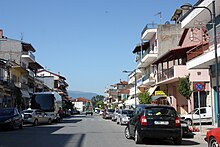This is an old revision of this page, as edited by Dolescum (talk | contribs) at 07:25, 22 May 2014 (→History: WP:NCMAC). The present address (URL) is a permanent link to this revision, which may differ significantly from the current revision.
Revision as of 07:25, 22 May 2014 by Dolescum (talk | contribs) (→History: WP:NCMAC)(diff) ← Previous revision | Latest revision (diff) | Newer revision → (diff) Settlement in Greece| Kato Nevrokopi Κάτω Νευροκόπι | |
|---|---|
| Settlement | |
| Country | Greece |
| Administrative region | East Macedonia and Thrace |
| Regional unit | Drama |
| Population | |
| • Community | 2,157 |
| Time zone | UTC+2 (EET) |
| • Summer (DST) | UTC+3 (EEST) |
| Vehicle registration | ΡΜ |


Kato Nevrokopi (Template:Lang-el "Lower Nevrokopi", Template:Lang-bg) is a municipality and town within that municipality in the northwest section of the Drama regional unit, Greece. Before the 2011 local government reform, it was the largest municipality in all of Greece, covering an area of 873.552 km² (337.28 sq mi). The 2011 census reported a population of 7,860 inhabitants. The region is known for the very low temperatures during the winter and for its famous agricultural products such as potatoes and beans. The area has several features to attract tourists: the ski center of Falakro, the traditional settlement in the village of Granitis (pop. 78), the historical bunker of Lise, the artificial lakes of Lefkogeia and Potamoí, the spectacular routes in the forests, the old churches. The forest paths offer excellent views to hikers. The largest towns are Kato Nevrokopi (the municipal seat, pop. 2,157), Volakas (1,028), Perithorio (898), Lefkogeia (465), Kato Vrontou (554), and Ochyro (514). On the territory of the municipality are located several abandoned villages, including Monastiri and Mavrochori.
History
Under the Ottoman Empire, the village was predominantly settled by Slavs, with small numbers of Turks and Vlachs. Following the Asia Minor Catastrophe and the subsequent population exchange, it was settled by large numbers of Greek refugees from Asia Minor. In 1927, its name was changed from Error: {{Lang}}: text has italic markup (help) to Kato Nevrokopi, after the neighbouring town of Nevrokop. On 18 April 1945, during fighting related to the Greek civil war, many Slavic inhabitants left the area. Many of them resettled in Štip, today in the Republic of Macedonia.
Notable people
References
- ^ "Απογραφή Πληθυσμού - Κατοικιών 2011. ΜΟΝΙΜΟΣ Πληθυσμός" (in Greek). Hellenic Statistical Authority.
- Name changes of settlements in Greece
External links
| Administrative division of the Eastern Macedonia and Thrace Region | ||
|---|---|---|
| Regional unit of Drama |  | |
| Regional unit of Evros | ||
| Regional unit of Kavala | ||
| Regional unit of Rhodope | ||
| Regional unit of Thasos | ||
| Regional unit of Xanthi | ||
| ||
| Subdivisions of the municipality of Kato Nevrokopi | |
|---|---|
| Municipal unit of Kato Nevrokopi |
|
 | This Eastern Macedonia and Thrace location article is a stub. You can help Misplaced Pages by expanding it. |